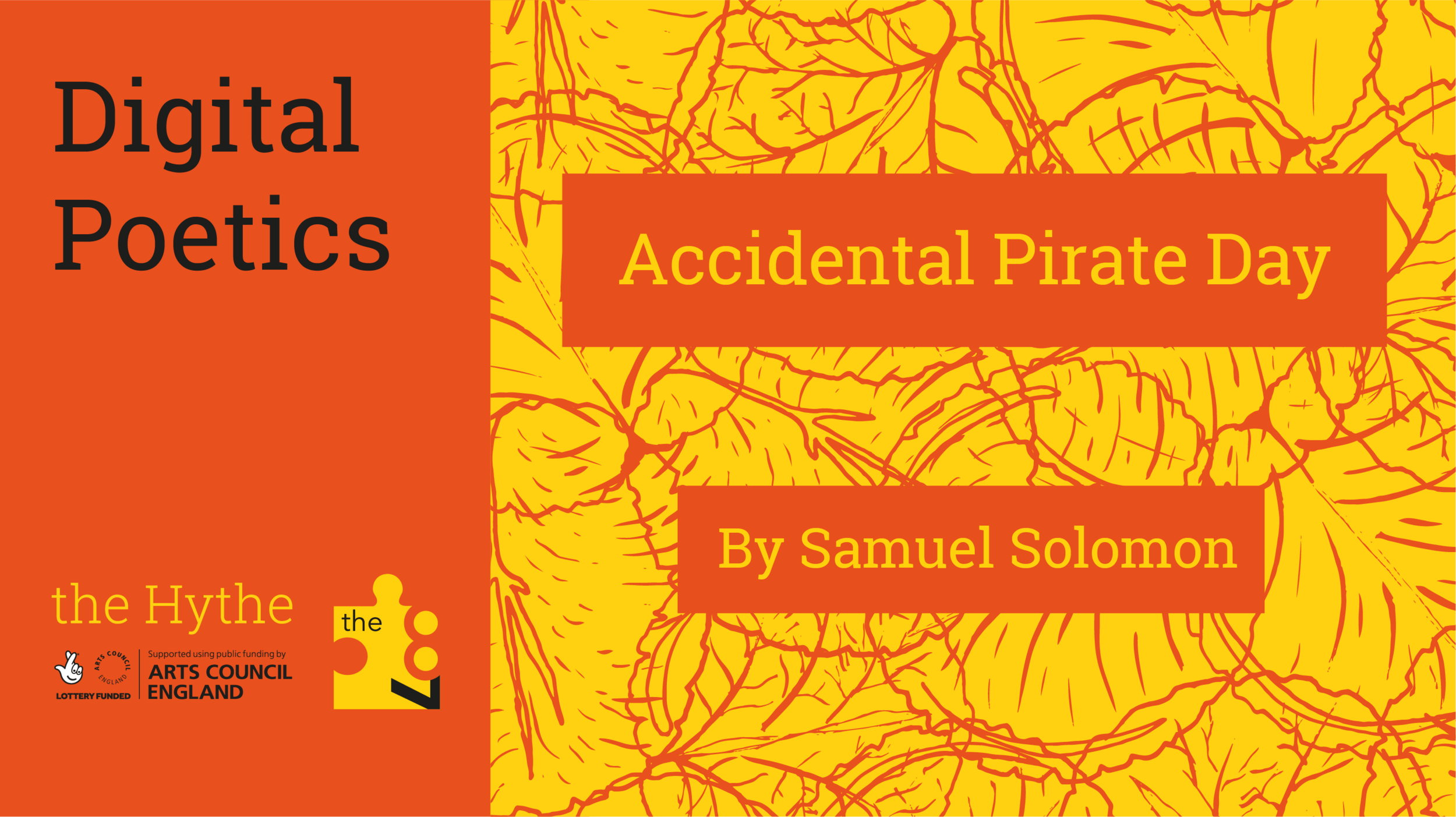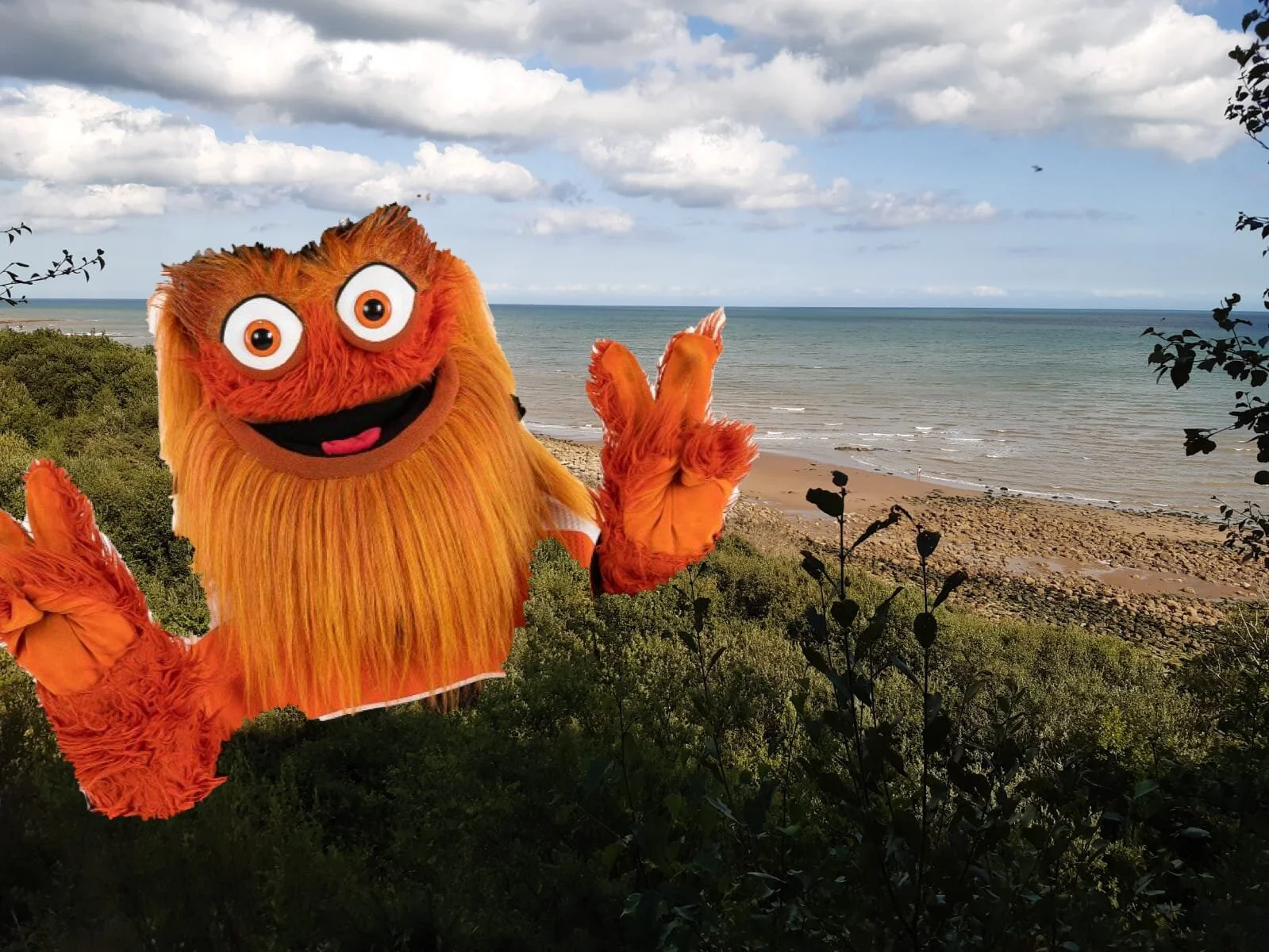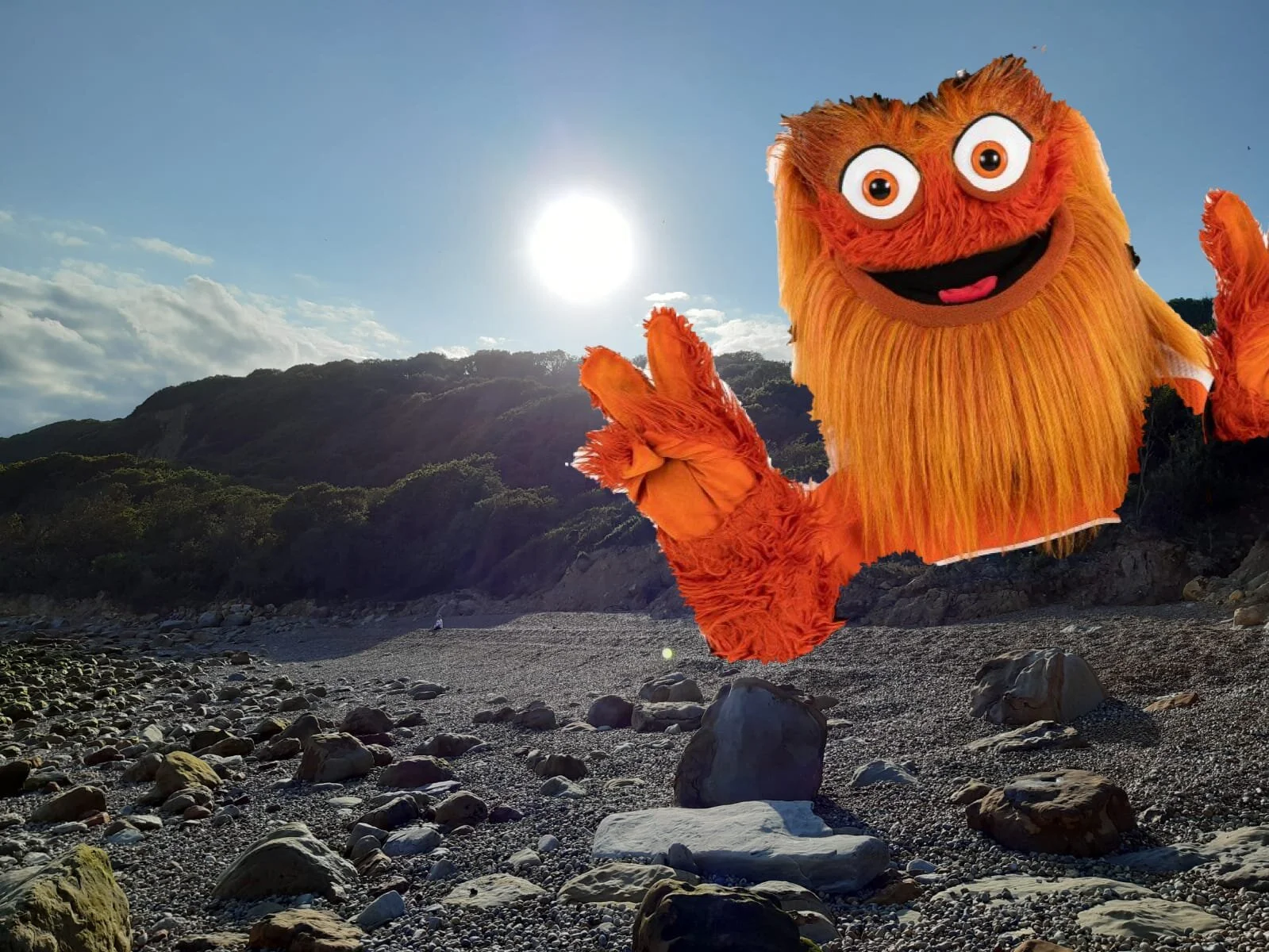Digital Poetics #12 Accidental Pirate Day: Samuel Solomon
1.
The first thing you see, in the open, is a man in a parrot suit.
When he takes the bird head off, his face blurs. It’s a warm afternoon in the
cat creeps and coves here, winding in and out of unreal summer light,
in and out of cat creeps and coves and light in a smugglers’ town,
in and out to bypass the pirates in the high street.
What is a landed pirate for?
A boy on the sex phone demands a kiss through his pirate face.
Later. For now I avoid the gazes of men
with dark eye makeup. Their violence is not even piratical.
I mean: the violence I picture them doing to me.
Cat creeps and coves, up and down, in and out of the open. I need to leave the old town, so I walk for over an hour getting lost on the way to the nude beach, where other sorts of looks at men might kill, differently. I’ve heard of different hideouts in the woods on the way to the beach. I will be able to secret myself.
It’s Pirate Day.
I’ll steal away.
2.
“We knew we’d blown Penzance out of the water”
Double decker buses arrive from Lydd, full of pirates.
The arrival of the pirates is projected to bring an influx of wealth to this coastal English town, the coastal English town with a tradition of wholesale customs evasions and privateering. This day brings in cash not by capturing eighteenth century Dutch ships or by smuggling but by accelerating drinks sales. A confabulated history of piracy smuggled in and anchored as regional distinction.
Parts of the town are overloaded with vestigial infrastructure not so much from the fishing trade or from smuggling (the subjects of museums) but from leisure spending, wealth leaking out of the capital or across the Weald from regional landowners. A Victorian ornamental garden sunken beneath the pavement on the seafront is littered with yellowing palm fronds: the welfare-state’s imperial decay. Party on the privately-owned pleasure pier.
There are so many pirates on land, making a very real architecture of flattening costumes. Under the flattening is variation. If these pirates got in the sea, stripped of their costumes, they might release a carnival. "The event organizers are so proud of the fact pirate day means so much to so many people. There is no discrimination. On that day you are a pirate."
3.
The nude beach, like the town center, like the woods in between, will be under-populated. Who maintains the paths between? Were these smugglers’ paths? Refuges for the lawless?
What other trades are out of frame?
We walk, from towns, in converging lines,
to learn if we’re alike and to be alike,
testing uneven capacities for touch,
bulwarked by the likenesses we make.
Two of us get lost walking the wide angle light and kissing — awaiting the smirk, delaying it, both too winded to kiss properly but mouths touching and breathing through noses — he eats my ass as I grab onto a surprisingly sturdy sapling. The sun is diffuse over the hill and the breeze is cool. After, I sit on an earthy rock and then have to pick the moss from my butt hair. I ask him to help check it’s gone. We’re both ginger, which makes us feel safer. Than we might. Is the magic of this sun the white magic of safety — even as we are so reckless at the cliff’s edge, even as we burn our ginger skin? No — we both feel a twinge of the irrational fear that we’ve murderously made.
Are these the ways to and from ancient smugglers coves?
Who cares for these paths, leading up and down?
Hawthorn shoots and bramble
weave together and leave ––– a flatness.
A scratch along the outer hip — like the impression of a waistband
or a wanted hand, only it stays —
nettle patches brush your legs
at a fork in the path
to a barely perceptible way, to the side,
where you await the arrival
of ––– something.
Who preserves the cliff-edge like this,
who makes the footpaths ready for
shitty wetwipes, lube packets, ice cream wrappers?
Imagine this network of paths as regional planning, planned before its customary use:
Maybe a public works project to juke employment stats?
Maybe it’s some unwatched lumpen worldmaking
Maybe medieval ways for tenants to reach the channel.
Surely it’s more local gentry’s care —
someone’s gardening of private land opened conditionally to the public —
a fence to climb over from the public bridleway.
4.
I got lost in the woods but found my way out,
and then chose to go back and get lost again.
But I didn’t know what I would find there, again.
I was lost, squinting into refractive glare, and —
Gritty showed up. What?
Crystal clear flash of matted orange.
Gritty, emphatically not a muppet,
can show up in space.
All day it was bright white under the sun, and Gritty is a redhead, too.
Gritty shows up, an ineffable pirate.
What worlds do his googly eyes bring forth?
Gritty shows up at the nude beach
Just orange shag everywhere.
There’s a wave, a Gritty resonance across the nude beach and its cruising dunes and jagged gorse outcrops
GRITTY APPEARS IN A FLASH
Impossibly majestic
Gritty shows up
— and then what?
The story always drops off here. Nothing can happen after this.
Inside the costume is like inside any other hideout —
sweaty, a catheter, a CamelPak, breathable lining,
airholes, and eyeholes
well below the googly eyes.
Outside the costume aphids
gather on the terror flower,
on the underside of bindweed leaves,
and wild echinacea bloom brighter.
A solitary bee sings a mountain song.
Gritty shows up — a vegetal face in emoji form.
The faceless men transform, wearing
the chitinous faces of movie pirates.
Synthetic leather Gritty pops up:
a vegetarian cannibal.
Gritty shows up in assless chaps
no anus.
no external genitalia.
A neon toadstool flashes on the creek bed.
I’m falling down the hill, rolling
down the hill catching my feet and
leaping down six meters onto the lichened rocky backshore
and tears roll down my face.
I look up and just keep seeing it:
Gritty swinging in and out of view
between the scrub oaks
and I fall back down
5.
You went w/ me through the woods
where we walked not together but in careful relation
in nearly parallel lines tending
toward convergence in a single line
as the public bridleway narrows either colliding
slackening distance or more often
stretching the distance as one of us decelerates
so that we go one by one
at a juncture of public way with private we fan out
and wait and hop the fence and wait for others
who have escaped the town, draping clothes over shoulders
and tracked shifting elliptical orbits around a clearing
we were waiting for something to arrive
to complete the sense of a journey
unsure if they had followed us from the town
or if it would arrive from somewhere else
and appear with all of the force and tragedy of
the secret held in every private park.
The internal borders of the town swirled all over themselves
and we use the town’s internal edges but we don’t know what made them
until a public image confirms for us their legacy or their destruction
as the insensible threads that walked us there spin up into balls
of synthetic furry yarn that flash a dirty crayon orange,
unroll and recombine before astonished eyes
on an invisible loom, miraculously taking bipedal form
and running perpetually in place facing us all in every possible direction
6.
Coming to on the beach, my eyes blur up at the cliff’s edge to find just flashes of orange fur floating in and out of the scrub. The sky is not yet orange but the light it casts on the cliff is carroty, the foreshore’s lichen late-sun-kissed on buttery sandstone. At the upper edge of vision is all orange fluff floating skyward. Gritty was there, in the cliff’s woods, but now he’s gone, all of the masked men out of sight. The air between my face and the cliff is indistinct.
I find myself walking, breathing through an extra skin of pollen, a layer of sunkist yellow, rubbed by solitary bees tapping me one by one, until my face is masked in honeyed dust and I’m scrambling back up the cliff, faster, toward the source of orange.
I spot what must be a smuggler in nude leggings and a simple mustard sleeping mask, a single California poppy tucked behind each ear, reaching out, plucking sea buckthorns from the shrubbery, dropping each berry in a chestnut trug. It’s not the season but I think I smell medlars. I see wild strawberries peeking out, and coral oyster mushrooms (not indigenous!). Behind the next oak, forking right on the path, a queue is forming, each smuggler masked up and ready to schlep their radiant, unpalatable collections up the escarpment and back to town.
We’re all masked now, prepared to smuggle out anything orange even if by smearing it on our skins. It’s clear we have to get back to town before the sun sets, before everything that is now washed out oversaturates, before our yellows and meadow green go violet, magenta, lavender, charcoal.
Gritty was here in a flash and gone: he cut off any chance of telling a story but by some other magic rearranged us, ready to parade in his orange wake. We escaped the town and now we’re going to take it. Everyone’s invited to join, even the pirates.
7.
I escaped for the day, but was stopped before
I could start smuggling in city-boy pastoral.
Nothing to hide now, nothing inside or behind
any mask, each one declares itself a border hiding nothing.
Unhiding, each mask is dusted orange.
All gathered in neat lines, uncertain as ever
how to form a parade from the outside of the town to the inside.
I step impatiently in place
and try not to catch heels but catch the woods with masks
like Velcro for every particle, teasels scrape,
burdock burrs on fur and hair and
everyone is masked and assembled in disorder,
reaching from behind the faceless banners to
smuggle history into each flash of orange,
smear it over each entire face: who’s dangerous in a mask,
who’s in danger as a parrot, a pirate, a mascot to magnetize force onto bodies.
The crowd is beside itself in the directions of the march —
in the order of assembly, the disorder of its tensions:
up, across, looping around, looping back to the paths where
you find all sorts, who a moment or an hour later
would have been there for you or not there
for you to nod to, blank, or high five.
If you high five Gritty its hand squeaks
louder and longer than the flash of appearance.
Raking out now, we are orange teeth coming out of the woods,
now clawing onto private lanes, then streets,
from what was not the town
but its magnetized relation to the town.
We know that back in town whiteness
might burn out the color of flame
so we mask it up, finally, with the orange truth.
*
Samuel Solomon is the author of Special Subcommittee (Commune Editions, 2017) and Lyric Pedagogy and Marxist-Feminism: Social Reproduction and the Institutions of Poetry (Bloomsbury, 2019), and he is co-translator from the Yiddish of The Acrobat: Selected Poems of Celia Dropkin (Tebot Bach, 2014). He lives in Brighton, where he works as a Senior Lecturer in English and Co-Director of the Centre for the Study of Sexual Dissidence.
*
This publication is in Copyright. Samuel Solomon, 2020.
The moral right of the author has been asserted. However, the Hythe is an open-access journal and we welcome the use of all materials on it for educational and creative workshop purposes.



